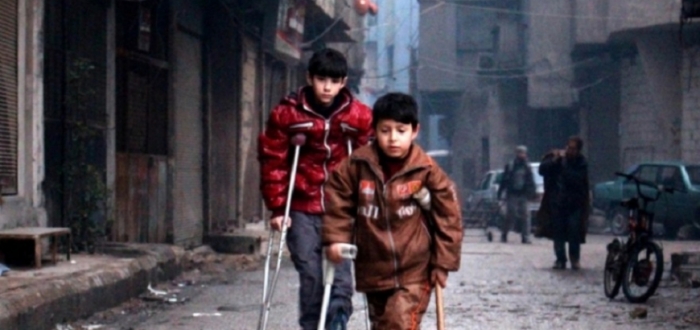The war in Syria has left around 300,000 cases of permanent disability among citizens, doctors claim, adding that the numbers of victims are still rising.
Nine-year-old Ibrahim Abid refuses to wear a prosthetic after his leg was amputated following a raid on the city of Douma, Eastern Ghouta, in October.
Abid said he feels too embarrassed to wear the artificial leg around his peers. His mother, Reham, says her child continues to suffer from ongoing nightmares and has trouble understanding the concept of prosthetic limb-fitting.
"He tells me that he is afraid of seeing his schoolmates, and believes that some of them will make fun of him, but none of this is happening, and we encourage him in the house and the street and at school, but once we start talking to him about limb-fitting, he starts to scream and cry," she says.
According to Reham, his prosthesis was provided by a humanitarian organization as the family was unable to afford its costs.
Dr. Nada Abdul Azim of the Eastern Ghouta medical office has attempted to draw attention to the growing suffering of Syrian people with special needs in the absence of health support.
"The tragedy of disability is associated with several problems, including displacement, poverty, and the lack of necessary treatment inside the country," Dr. Abdul Azim explained.
The doctor added that disabilities are "divided into different types of amputations, hazardous defects, paralysis in vital functions, and brain injury."
"With the continuation of the daily and indiscriminate shelling against civilians, we are afraid of encountering many more cases."
Walid Kulthum lost his legs and an eye when he stepped on a landmine in Jobar neighborhood near Damascus.
The 15-year-old says he is unable to move now, and says the injury happened while he was at his home.
Families of those living with disabilities in opposition-held areas have complained about the lack of available medical care, calling on organizations of the revolutionary movement to secure health care for their family members.
But officials say there is a significant shortfall in the medical field, while other officials have made clear that dealing with disabilities requires the proper means to help those with disabilities to facilitate their own affairs, which has become almost impossible due to the siege.
The installation of prosthetic limbs for people with motion disabilities is a distant dream for the poor, where the cost ranges between $500 and $1,200.
Five-year-old Bahja was born in the town of al-Maliha in eastern Ghouta. She was wounded by shrapnel when rockets landed on her house, causing her to become permanently disabled.
Bahja's family has appealed to officials and humanitarian agencies to help treat the wound in her right foot since 2013. Her father, Mohammed, says his daughter's health has deteriorated due to the siege and a lack of medicine, adding she is in urgent need to travel abroad to receive medical treatment.
This article was translated and edited by The Syrian Observer. Responsibility for the information and views set out in this article lies entirely with the author.


